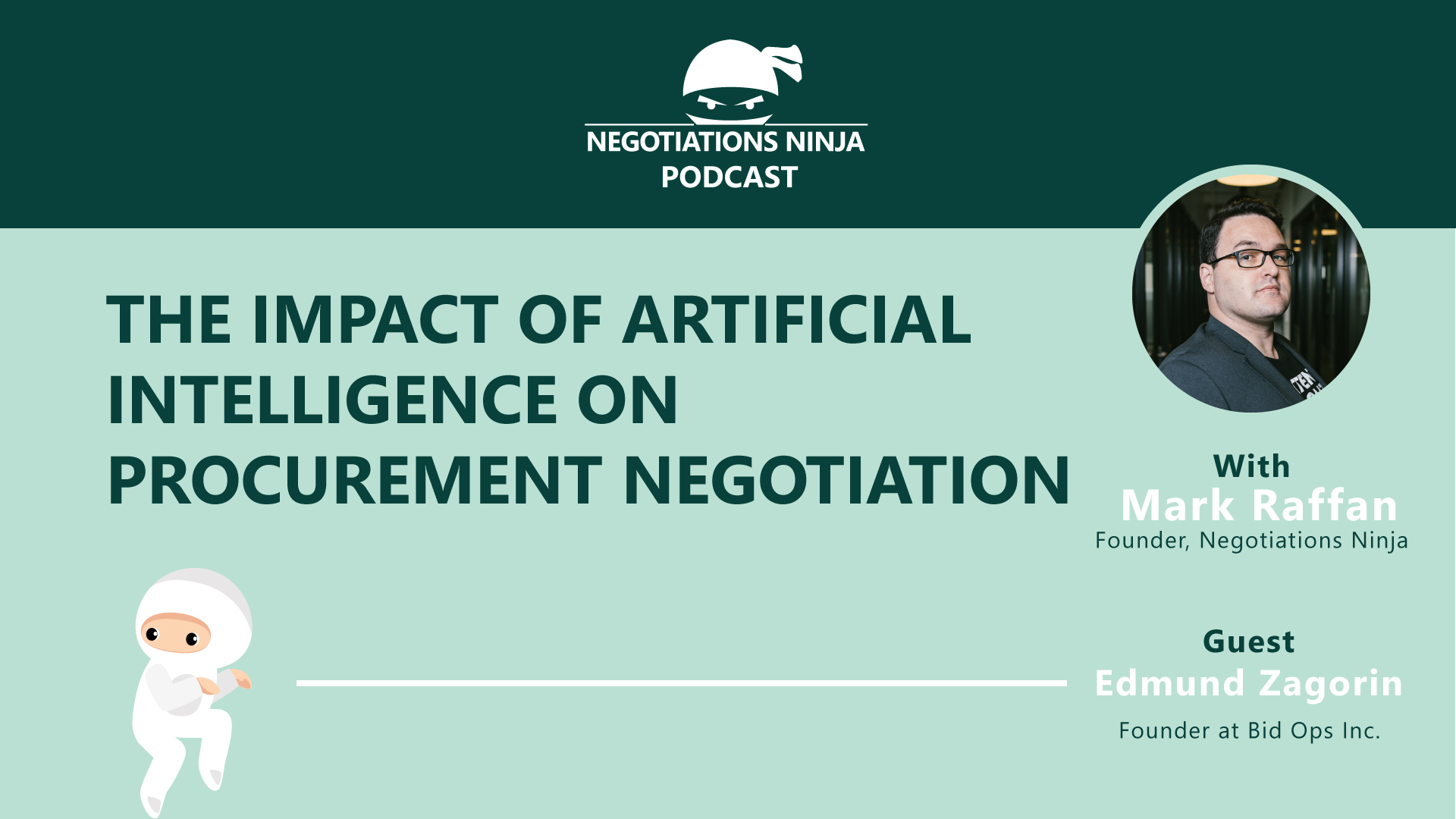The use of artificial intelligence is widespread throughout many industries and is becoming available in procurement negotiation with a platform called Bid Ops. Bid Ops is one of the first companies to use artificial intelligence to fully automate supplier negotiations. Edmund Zagorin joins me in this episode of Negotiations Ninja to talk about how Bid Ops forecasts the outcome of a negotiation, develops quotes, and helps smooth the negotiation process.
Edmund is the founder and CEO of Bid Ops. He started his career as a procurement officer as well as the Assistant Program Director for Debate at the University of Iowa. It was there he learned to see the correlation between debate and negotiation tactics. He researched procurement with ProductBio and became a Bid Manager at Electronic Auction Services. Listen to this episode to hear how his combined experience led him to create a sourcing enablement platform making waves in the industry.
Outline of This Episode
- [1:58] Edmund Zagorin’s background in procurement
- [3:50] How do you forecast the outcome of a negotiation?
- [6:45] What’s the difference between a debate and a negotiation?
- [11:19] Understanding cognitive bias in behavioral economics
- [17:20] Who should extend the first offer?
- [18:47] Will AI replace procurement managers?
- [26:45] Edmund advises: continue to try new things
Sourcing enablement for the modern business
The question everyone is asking is this: How in the world do you forecast the outcome of a negotiation? A sourcing manager can use their experience in the industry to hypothesize an outcome—but they can’t forecast an exact outcome. But if they make the negotiation more competitive and add more suppliers a better outcome can be achieved. Communicating criteria that are important to you will also affect the outcome.
The Bid Ops model takes into account different variables, the 3 most important being: competitiveness, distribution of financial impact across line items, and the prior relationship between the specific suppliers and specific buying entities. Their model is entirely based on behavioral analysis—not changes in the market or spend across a given organization. It factors a discount rate from those variables. Listen to hear more details.
How does cognitive energy come into play
Cognitive biases in behavioral economics are things many people are familiar with. Bid Ops builds on much of the works and findings of others on cognitive bias. Edmund always asks, what part of a negotiation unnecessarily consumes cognitive energy? Is it typing into a text field to find a specific price? Finding and comparing two values in different columns on a spreadsheet? Is it submitting a quote? Answering questions in a survey?
Edmund suggests using your counterparty’s cognitive energy on one thing: getting you the best outcome that you can get. The more that you can eliminate other tasks they would normally have to do, the more they can focus on the relationship. Bid Ops generates a quote on behalf of the supplier so they don’t have to use cognitive energy to come up with the line item price. The goal is to come up with a quote that preserves their margin but still wins them the business. It removes a cognitively difficult step in the process.
The concept of anchoring
Humans tend to rely on the first piece of information that we get. Statistically, we end up landing on a number closer to that first number than any counter-offer. Edmund points out that it’s often used in a sentence as, “Anchoring my expectations to the first offer that was given”. You’re telling bidders that this is what your number should be. You’re removing the cognitive guesswork and doing the work for them—here’s what you need to do to be more competitive.
The person that makes the first offer has the advantage even if one of several suppliers. Buyers that make the first offer end up driving more savings across the board even if they’re wrong. A2001 paper by Galinsky, Ku, and Mussweiler determined that whoever makes the first offer determined and anchored the final selling price, which holds true for any product or service category.
Will artificial intelligence replace procurement managers?
Artificial intelligence will make our jobs more efficient—it’s just a matter of time. AI platforms don’t have emotions or baggage attached, their calculations are based on game theory. Edmund believes some parts will become entirely automated such as in logistics or electronics components. There isn’t a ton of nuance that can’t be expressed mathematically.
But there are long-term strategic partnerships where it is all about developing a relationship. Edmund points out that these partners will “go above and beyond for the buying organization in ways that cannot be quantified”. Perhaps they can make a rough shipment show up on time in hard-to-reach areas—which they’re not obligated to do. Some partners may alter their systems to accommodate a buyer.
The bottom-line is human-business relationship dynamics cannot be replaced by artificial intelligence. Edmund believes, if anything, it will make those relationships even more important. Listen to the whole episode for the complete discussion on how automate supplier negotiations.
Resources & People Mentioned
- BOOK: Thinking, Fast and Slow
- BOOK: Freakonomics
- BOOK: Don’t Make Me Think
- PAPER: The Case of Auctions Versus Negotiations
Connect with Edmund Zagorin
Connect With Mark
- Follow Negotiations Ninja on Twitter: @NegotiationPod
- Connect with Mark on LinkedIn
- Follow Negotiations Ninja on LinkedIn
- Connect on Instagram: @NegotiationPod
- negotiations.ninja




